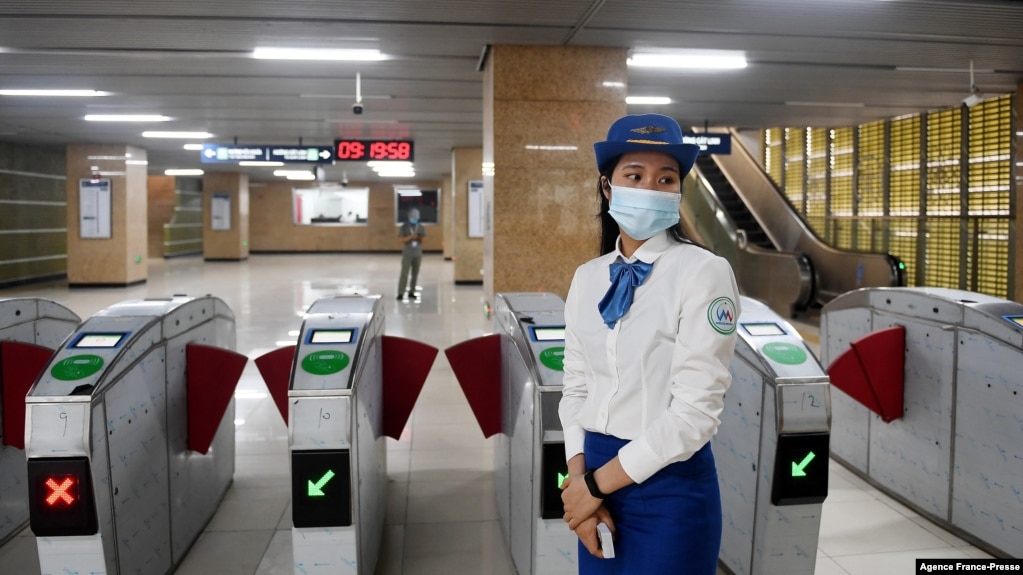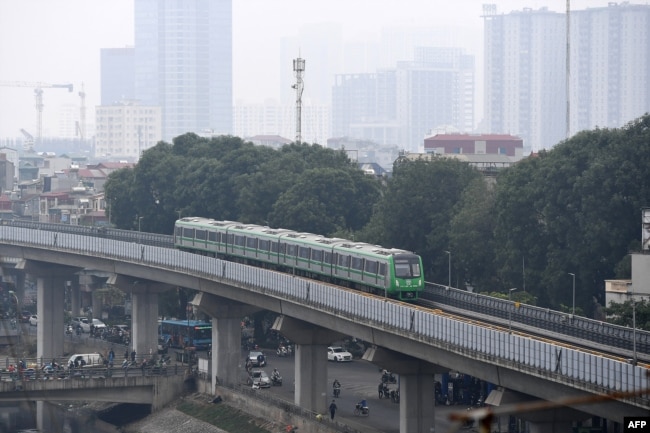The Cat Linh-Ha Dong city train line in Hanoi, Vietnam entered service on November 21.
It is Vietnam’s first metro train. People are saying good things about the train line. But others are questioning the project.
The 13-kilometer-long line has 12 stations. It starts at Cat Linh railway station in north-central Hanoi and ends in the southwestern area of Ha Dong. The train can travel at up to 80 kilometers an hour. The trip along the whole line takes about 24 minutes. It is designed to be able to carry 1 million passengers a day when finished.
The line is expected to ease traffic and reduce private vehicle use in Hanoi. Citizens in Vietnam’s capital said the quality of the service is good. They are hopeful about the metro line..

An attendant stands near turnstiles at Lang station in Hanoi, Vietnam, Nov. 6, 2021, on opening day of the city’s first urban metro train running along the Cat Linh-Ha Dong line. (Photo by Nhac NGUYEN / AFP)
A Hanoi office worker who asked that her name not be used noted that she cannot use the new line to get to work. But, she said she hopes it will help reduce traffic, shorten travel times, and reduce transportation pressures.
“Since I care about the environment, people’s use of public transport will make a significant contribution to reducing dust and noise pollution,” she told VOA.
During two-weeks of free trial service at its opening, crowds gathered to ride. But, Vietnamese media last month reported a lack of passengers. Reports from the first days of ticket sales suggest that the number of passengers was low, at about 12,000 a day. That is equal to only eight percent of capacity.

This should worry the Hanoi city government, which oversees the project. Building the line has been delayed by many years and has cost more money than officials planned.
In 2008, the project had a total starting budget of $552.8 million. By 2017, the amount had increased to about $868 million.
“Leaders of the transport industry have so many times promised to put it into operation, but then the promises are broken, causing people to be angry and skeptical,” said Nguyen Van Thanh, a retired worker in Ha Dong.
Dieu Anh works in public relations at a company that deals in property. She told VOA that the people of Hanoi used to have high expectations for the metro line. But after so many missed deadlines, the people were unsure.
“It was not until the metro line operated that I dared to believe that it had finally happened,” she said.
Observers say Vietnam lacks the experience to carry out such projects. It is just the second city railway in Vietnam after the Nhon-Hanoi line, which is still being built.
South China Sea disputes between Vietnam and China add to the difficulties. China is a major provider of money for the project. But the project faced delays after a China placed an oil exploration structure in nearby waters claimed by Vietnam.
As a result, when the metro line entered service, Vietnamese social media critics talked about the “Chinese factor.” They called for “boycotting China’s project.”
“Our forefathers taught us that once you lose faith, you lose faith 10,000 times,” the retiree Thanh told VOA. He said he was not satisfied with China’s efforts.
Thanh said, if he could choose again, he would choose Japanese or Cuban companies. He said that is “because there has been evidence that these countries have done good quality work in all aspects.”
Not everyone agrees with the boycott calls. The office worker said boycott calls are emotional, one-sided, and unnecessary. She said the line remains valuable and how it was paid for is not related to its use.
However, she said she still believed that Japanese contractors would be a better choice for future projects.
“Japan is a country with a lot of experience in building public transport systems and also very interested in environment protection,” she added.
I’m Mario Ritter, Jr.
Mario Ritter Jr. adapted this VOANEWS story for VOA Learning English. Susan Shand was the editor.
_________________________________________________
Words in This Story
significant –adj. large enough to be noticed and have an effect
contribution –n. something that is done to cause something to happen
capacity –n. the ability to hold or contain people or things — usually singular
skeptical –adj. having or expressing doubt about something
dare –v. to not be afraid to do something
factor –n. something that helps produce or influence a result : one of the things that cause something to happen
aspect –n. the way, or one of the ways, a person, place, or thing appears
We want to hear from you. Write to us in the Comments section, and visit WWW.VOA-STORY.COM